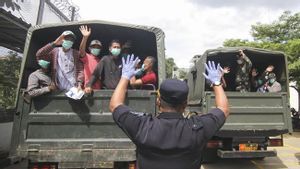JAKARTA - The Indonesian Ministry of Foreign Affairs has carried out the gradual evacuation of Indonesian citizens (WNI) from Lebanon, and currently there are around 116 others who choose to survive, when the conflict in the Middle East spreads with the outbreak of the Israeli and Hezbollah wars in southern Lebanon.
The Director of Protection for Indonesian Citizens at the Indonesian Ministry of Foreign Affairs, Judha Nugraha, said that since the outbreak of the conflict in Gaza, Palestine on October 7 last year, the Ministry of Foreign Affairs has prepared a contingency plan and is coordinating with all Indonesian representatives in the Middle East.
On October 10, Judha continued, the Indonesian Embassy in Beirut in Lebanon had set Alert 1 status for the southern Lebanese region and asked Indonesian citizens in the region to evacuate.
"Many choose to stay because they feel safe, but some eventually want to move to the Indonesian Embassy in Beirut," Judha said in a press statement in Jakarta, Friday, October 4.
The increase in escalation this year has made all regions in Lebanon dangerous. On August 4, the Indonesian Embassy in Beirut expanded its Alert 1 status throughout Lebanese territory and began the evacuation process for Indonesian citizens.
"On August 10, 18, there were 25 Indonesian citizens who were willing to be evacuated by air and Alhamdulillah they had arrived in Indonesia," said Judha.
"On August 29, we held a virtual meeting with Indonesian citizens, conveying the estimated situation in the future. Initially, only 6 finally there were 40 Indonesian citizens who were willing to be evacuated," Judha continued.
"On October 2, 20 Indonesian citizens were evacuated from the Indonesian Embassy in Beirut to Damascus (Syria) then to Amman (Yordania) by land," explained Judha.
"And on October 3, there were 20 more that were evacuated by land to Damascus and were on their way to Amman," he added.
Judha said, as of October 4, there were still 116 Indonesian citizens in Lebanon. The number has gone up and down, because some have come out via commercial flights, some have just reported themselves.
"The surviving majority are Indonesian citizens who are married to Lebanese citizens, students and migrant workers. There are four Indonesian citizens in southern Lebanon, one of whom works for UNIFIL," explained Judha.
In total, in the five evacuation stages that have been carried out by the Indonesian Embassy in Beirut, 65 Indonesian citizens have been successfully evacuated, as well as a Lebanese who is a couple of Indonesian citizens.
Regarding those who survive, Judha said for students, because they are in the northern region and have minimal attacks on Israe, the campus has not set an emergency status, worrying if participating in the evacuation is set to drop out of college. As for migrant workers, they are worried about losing their jobs.
SEE ALSO:
"The Indonesian Embassy conveyed the evacuation of force major in nature and asked to be able to evacuate Indonesian citizens, so that the Indonesian Embassy communicated to campuses and employers," explained Judha.
Judha added that the task of the state according to the law is to evacuate when an emergency occurs. However, the option to participate or not return to the citizens themselves.
"What we want to highlight is that evacuations must be carried out now, before the war increases openly and evacuation capabilities are limited," said Judha.
The English, Chinese, Japanese, Arabic, and French versions are automatically generated by the AI. So there may still be inaccuracies in translating, please always see Indonesian as our main language. (system supported by DigitalSiber.id)


















